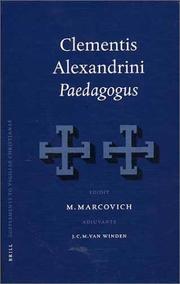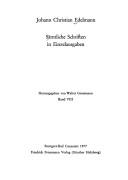| Listing 1 - 10 of 21 | << page >> |
Sort by
|
Book
Year: 1967 Publisher: Hildesheim: Olms,
Abstract | Keywords | Export | Availability | Bookmark
 Loading...
Loading...Choose an application
- Reference Manager
- EndNote
- RefWorks (Direct export to RefWorks)
Alogi --- Church calendar --- Cerinthus --- Jesus Christ
Book
ISBN: 1946230456 1946230448 Year: 2020 Publisher: Claremont, CA : Claremont Press,
Abstract | Keywords | Export | Availability | Bookmark
 Loading...
Loading...Choose an application
- Reference Manager
- EndNote
- RefWorks (Direct export to RefWorks)
Logos (Christian theology) --- Logos --- Word of God (Christian theology) --- Alogi
Book
ISBN: 9788834317198 Year: 2008 Volume: 32 Publisher: Milano Vita e pensiero
Abstract | Keywords | Export | Availability | Bookmark
 Loading...
Loading...Choose an application
- Reference Manager
- EndNote
- RefWorks (Direct export to RefWorks)
Comparative civilization --- Logos (Christian theology) --- Logos (Philosophy) --- Logos --- Philosophy --- Word of God (Christian theology) --- Alogi

ISBN: 9004124705 9004313265 9789004124707 9789004313262 Year: 2002 Volume: 61 Publisher: Leiden Brill
Abstract | Keywords | Export | Availability | Bookmark
 Loading...
Loading...Choose an application
- Reference Manager
- EndNote
- RefWorks (Direct export to RefWorks)
The Paedagogus of Clement of Alexandria is almost completely preserved almost completely in a single manuscript, the famous Codex Arethae, copied in the second decade of the tenth century for Arethas, the Archbishop of Caesarea in Cappadocia. The text was copied from an exemplar in poor shape, to the extent that the codex (P) is full of textual corruptions. Most of the first book of the Paedagogus is lost in P. For this part the author had to rely on two old apographs of P. The only extant critical edition of the text was provided by Otto Stählin in 1905. Although in later editions (1936, 1972) corrections and additions were appended, the author was of the opinion that this predecessor was not attentive enough to the meaning of Clement's text and to the textual problems involved. As a result scholars still lack a reliable critical text of the treatise. Marcovich has tried to improve Stählin's remarkable edition by emending the transmitted text wherever it did not make sense, while relying on Clement's sources and on his lexicon and expression employed elsewhere in his opus.
Logos (Christian theology) --- Christian life --- Word of God (Christian theology) --- Alogi --- Logos --- Clement, --- Clemens, --- Clemens, Titus Flavius, --- Clément, --- Clemente, --- Klemens, --- Klēmēs, --- Kliment, --- Titus Flavius Clemens, --- إكليمنضس السكندري --- Christian life - Early works to 1800.
Book
ISSN: 0920623X ISBN: 9789004309388 9004309381 9789004309395 900430939X Year: 2016 Volume: 135 Publisher: Leiden Brill
Abstract | Keywords | Export | Availability | Bookmark
 Loading...
Loading...Choose an application
- Reference Manager
- EndNote
- RefWorks (Direct export to RefWorks)
In this work T. Scott Manor provides a new perspective on a common view, known as the ‘Johannine Controversy’, which maintains that the early church once tried to jettison the Gospel and Apocalypse of John as heretical forgeries. Primary evidence comes from Epiphanius of Salamis, who mentions a heretical group with such views, the Alogi . This along with with other evidence from sources including Irenaeus, Hippolytus, Origen, Eusebius, Photius, Dionysius bar Salibi, Ebed-Jesu and others has led to the conclusion that a certain Gaius of Rome led the Alogi in this anti-Johannine campaign. By carefully examining Epiphanius’ account in relation to these other sources, Manor arrives at very different conclusions that question whether any such controversy ever existed at all.
Bible. --- Criticism, interpretation, etc. --- Bible --- Criticism, interpretation, etc --- History --- Alogi. --- 226.5 --- 228 --- Alogians --- Christian heresies --- Logos (Christian theology) --- Evangelie volgens Johannes --- Apocalyps. Boek der Openbaring van Johannes. Apocalyptiek --- Epiphanius, --- Epifaniĭ, --- Epifanio, --- Epipʻan, --- Epiphane, --- Epiphanios, --- Kipratsʻi, Epipʻan, --- Kipurskiĭ, Epifaniĭ, --- Epiphanius --- Jean (Book of the New Testament) --- Johanisi (Book of the New Testament) --- Johannesevangelium --- John (Book of the New Testament) --- Yohan pogŭm --- Yohane den (Book of the New Testament) --- Yūḥannā (Book of the New Testament) --- Alogi --- Ioganaĭ (Book of the New Testament) --- Иоганай (Book of the New Testament) --- 30-600 --- Early Church Period --- Primitive and Early Church Period
Book
ISBN: 9782343030326 2343030324 Year: 2014 Publisher: Paris l'Harmattan
Abstract | Keywords | Export | Availability | Bookmark
 Loading...
Loading...Choose an application
- Reference Manager
- EndNote
- RefWorks (Direct export to RefWorks)
Cet ouvrage analyse le statut du logos (langage, discours) de Paul de Tarse, mené à partir de sa Première lettre aux Corinthiens. Le "langage de la Croix" dont il est le porte-parole exclut-il toute forme de rationalité philosophique ? Si tel est le cas, ce type de langage ne risque-t-il pas d'être caractérisé par l'irrationnel et la folie ? Au terme de cette enquête, le logos de Paul de Tarse est plus nuancé et plus subtil qu'il n'y paraît.
Logos (Christian theology) --- Logos (Philosophy) --- Logos (Théologie chrétienne) --- Logos (Philosophie) --- Bible. Epistles of Paul --- Commentaries --- 227.1*2 --- Logos --- Word of God (Christian theology) --- Alogi --- Brieven van Paulus aan de Corinthiërs --- Bible. --- 1 Corinthians (Book of the New Testament) --- First Corinthians (Book of the New Testament) --- 227.1*2 Brieven van Paulus aan de Corinthiërs --- Logos (Théologie chrétienne)
Book
ISBN: 379171001X 9783791710013 Year: 1986 Volume: 17 Publisher: Regensburg Pustet
Abstract | Keywords | Export | Availability | Bookmark
 Loading...
Loading...Choose an application
- Reference Manager
- EndNote
- RefWorks (Direct export to RefWorks)
Logos (Christian theology) --- Gnosticism --- History of doctrines --- Bible --- Criticism, interpretation, etc --- 226.5 --- 273.1*1 --- -ROLDUC-SEMI --- #GROL:SEMI-22<08> Bibl 17 --- Logos --- Word of God (Christian theology) --- Alogi --- Evangelie volgens Johannes --- Gnosis en Bijbel --- 273.1*1 Gnosis en Bijbel --- ROLDUC-SEMI --- Bible. --- Criticism, interpretation, etc. --- Cults --- Logos (Christian theology) - History of doctrines - Early church, ca 30-600

ISBN: 3772801110 Year: 1977 Volume: Band VIII Publisher: Stuttgart-Bad Canstatt Frommann (Holzboog)
Abstract | Keywords | Export | Availability | Bookmark
 Loading...
Loading...Choose an application
- Reference Manager
- EndNote
- RefWorks (Direct export to RefWorks)
Apologetics --- -Christianity --- -Faith and reason --- -Logos --- Logos (Christian theology) --- Logos --- Word of God (Christian theology) --- Alogi --- Faith and logic --- Logic and faith --- Reason --- Reason and faith --- Reason and religion --- Religion and reason --- Christianity --- Religions --- Church history --- Apologetics, Missionary --- Christian evidences --- Evidences, Christian --- Evidences of Christianity --- Fundamental theology --- Polemics (Theology) --- Theology, Fundamental --- Religious thought --- Theology --- Early works to 1800 --- Religious aspects --- Evidences --- Locke, John --- ロック --- 로크 --- Faith and reason --- Locke, John,
Book
ISBN: 9781409406457 9781409406716 9781409406464 9781409473527 1409406458 1409406717 1409406466 140947352X 1315587831 1283805146 1317118839 1317118847 9781283805148 9781315587837 9781317118824 9781317118831 Year: 2013 Publisher: Farnham, England ; Burlington, Vt. : Ashgate Pub. Ltd.,
Abstract | Keywords | Export | Availability | Bookmark
 Loading...
Loading...Choose an application
- Reference Manager
- EndNote
- RefWorks (Direct export to RefWorks)
This book investigates the concept of logos in pagan, Jewish and Christian thought, with a view to elucidating the polyphonic functions which the word acquired when used in theological discourse. Edwards presents a survey of theological applications of the term Logos in Greek, Jewish and Christian thought from Plato to Augustine and Proclus. Bringing together materials which are rarely synthesized in modern study, this book shows how Greek and biblical thought part company in their appraisal of the capacity of reason to grasp the nature of God, and how in consequence verbal revelation plays a
276:232 --- Logos (Philosophy) --- Philosophy, Ancient. --- Logos (Christian theology) --- -Incarnation. --- Christianity. --- Judaism. --- Logos --- Philosophy --- Jews --- Religions --- Semites --- Christianity --- Church history --- Kenosis (Theology) --- Word of God (Christian theology) --- Alogi --- Ancient philosophy --- Greek philosophy --- Philosophy, Greek --- Philosophy, Roman --- Roman philosophy --- Patrologie. Patristiek-:-Jezus Christus. Christologie: dogmatisch. De Verbo incarnato --- History of doctrines --- -Religion --- Religion --- -276:232 --- Logos (Philosophy). --- Incarnation. --- Logos (Christian theology) -- History of doctrines -- Early church, ca. 30-600. --- Philosophy, Ancient --- Incarnation --- Judaism --- Philosophy & Religion

ISBN: 2213619050 9782213619057 Year: 2004 Volume: 99 Publisher: Paris Fayard
Abstract | Keywords | Export | Availability | Bookmark
 Loading...
Loading...Choose an application
- Reference Manager
- EndNote
- RefWorks (Direct export to RefWorks)
Doctrine of God (christianism) --- Plato --- Church fathers --- Fathers of the church --- Kerkvaders --- Patristic philosophy --- Patristics --- Patristiek --- Patristique --- Patrologie --- Patrology --- Philosophy [Patristic ] --- Pères de l'Eglise --- Theology of the Word --- Théologie du Verbe --- Verbe (Theologie) --- Woord (Theologie) --- Woordtheologie --- Word (Theology) --- Criticism and interpretation --- Logos (Philosophy) --- Logos (Christian theology) --- Philosophical essay - Platonism - 17th century --- Criticism and interpretation. --- Logos --- Philosophy --- Word of God (Christian theology) --- Alogi --- Plato. --- Aflāṭūn --- Aplaton --- Bolatu --- Platon, --- Platonas --- Platone --- Po-la-tʻu --- Pʻŭllatʻo --- Pʻŭllatʻon --- Pʻuratʻon --- Πλάτων --- אפלטון --- פלאטא --- פלאטאן --- פלאטו --- أفلاطون --- 柏拉圖 --- 플라톤 --- Platon --- Platoon --- Influence --- Theology [Doctrinal ] --- History --- Primitive and early church, ca. 30-600 A.D. --- Платон --- プラトン
| Listing 1 - 10 of 21 | << page >> |
Sort by
|

 Search
Search Feedback
Feedback About UniCat
About UniCat  Help
Help News
News